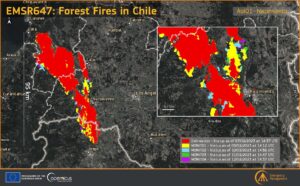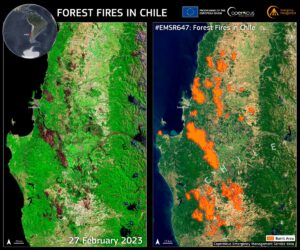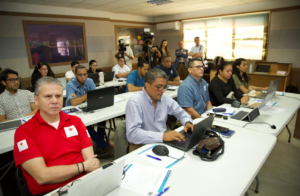On World Humanitarian Day 2025, the CopernicusLAC Panama Centre joins the global community in honouring humanitarian workers and organisations which dedicate their efforts to protecting lives and supporting vulnerable communities.
Latin America and the Caribbean (LAC) face a complex humanitarian landscape: in 2024 alone, it was estimated that more than 38 million people required humanitarian assistance. Between 2000 and 2022, over 190 million people were affected by extreme weather events. These figures highlight the urgency of strengthening preparedness and response capacities in a region which is highly exposed to climate-related risks.
Copernicus data: supporting action before, during and after disasters
Reliable information is essential for effective humanitarian action. Free and open Earth Observation (EO) data from the European Union’s Copernicus Programme has become an indispensable tool in the LAC region. Before a crisis, Copernicus data supports preparedness by helping authorities and humanitarian organisations assess risks and monitor vulnerable areas. During emergencies, the Copernicus Emergency Management Service (CEMS) On-Demand Mapping component can be activated to deliver near real-time maps which increase situational awareness of affected areas and guide decision-making. After disasters, Copernicus products inform recovery and reconstruction planning, ensuring that rebuilding efforts strengthen resilience and reduce future vulnerabilities.
Real-world applications of Copernicus in humanitarian response
The positive impact of Copernicus services has been clearly demonstrated in recent humanitarian operations.
In early 2023, severe wildfires 100 km east of Santiago led Chilean authorities to request the activation of the CEMS On-Demand Mapping service. The service delivered 38 mapping products, derived from satellite data, to support on the ground actors and inform emergency response. In addition, the European Commission’s Directorate General for Civil Protection and Humanitarian Aid Operations (DG ECHO), on behalf of CONAF (Corporación Nacional Forestal), activated CEMS to support post-wildfire damage assessment and recovery operations of the affected area in the Valparaiso region. These products, such as the delineation map below, are useful for understanding the extent of fires and their impacts on key infrastructure, enabling emergency response teams to better coordinate and optimise their efforts.

Multi-temporal data visualisation produced using the Copernicus Emergency Mapping Service products delivered for the Nacimiento Area of Interest, in Chile, between 7 and 12 February 2023. Credit: European Union, Copernicus Emergency Management Service.

Burnt scars seen by Copernicus Sentinel-2 satellites (left) and using the Delineation products delivered by the Copernicus Emergency Management Service within the On-Demand Mapping activation EMSR647 (right). Credit: European Union, Copernicus Sentinel-2 imagery, 27 February 2023; European Union, Copernicus Emergency Management Service.
Another recent example is the series of earthquakes which struck Guatemala in July 2025, affecting an estimated three million people. The strongest shock reached a magnitude of 5.6 and triggered multiple secondary hazards, including mass movements, landslides, infrastructure damage and blocked roads. To support the response, the CEMS On-Demand Mapping service was activated to deliver reference maps, event extent mapping, and detailed damage assessments. Drawing on the analysis of 28 satellite images, the CEMS On-Demand Mapping team identified over 94.5 hectares of landslides and approximately 3 km of affected roads within the areas surveyed.
The role of the CopernicusLAC Panama Centre
The examples of Chile and Guatemala highlight how Copernicus data can directly support humanitarian action in Latin America and the Caribbean. To maximise this impact regionally, the CopernicusLAC Panama Centre was established under the EU–LAC Digital Alliance as a flagship initiative of the EU Global Gateway. Its mission is to make the free and open data of the European Union’s Copernicus Programme more accessible and relevant for Latin America and the Caribbean. Acting as a regional hub, the Centre develops Earth Observation services tailored to local realities, with a focus on hydrometeorological hazards, wildfires, geohazards, and exposure mapping.
The Centre works hand in hand with humanitarian organisations, government, institutions, academia and civil society to turn Copernicus data into actionable insights for disaster risk reduction and climate resilience. At the same time, it invests in knowledge-sharing and skills development. Through its Digital Campus, it provides access to free online resources and training, complemented by online and in-person training activities which give participants hands-on experience in applying EO technologies.

Participants from the CopernicusLAC Panama Centre in-person training which took place in Panama City in July 2025. Credit: CopernicusLAC Panama Centre
Beyond training, the Centre drives community engagement and innovation by hosting hackathons, matchmaking sessions, policy dialogues and other events which connect local users with international expertise. In this way, the CopernicusLAC Panama Centre strengthens local capacities, empowers decision-makers, and helps build an ecosystem where humanitarian action, environmental protection and data-driven policymaking go hand in hand.
A commitment to humanitarian action and resilience
By celebrating World Humanitarian Day, the CopernicusLAC Panama Centre reaffirms its commitment to supporting humanitarian actors in Latin America and the Caribbean. Through satellite technologies, local partnerships and capacity-building initiatives, the Centre strengthens the ability of humanitarian organisations to save lives, protect the environment and build resilience for communities across the region.





